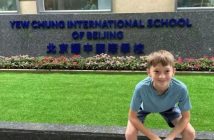Doctor, Doctor, What Should I Be?
In search of a career – STAT!

I have always dreamed about being a doctor. I’ve always thought that saving lives in a hospital was more appealing than working at a job wearing a constricting suit in the office all day. My first experience in the world of medicine began when I was assigned to follow a doctor for a week.
To be honest, when I was younger, like any other kid, I dreaded any medical encounter – I was anxious when I went for a dental checkup and after two weeks in a hospital in France due to a serious case of chicken pox, I felt much better suited to be a doctor than a patient. Still, I was excited to see the real world and a real job, all outside the comfort zone of my school classroom.
Day 1: At 8am, I headed into the clean and disinfected corridors of the general clinic in the International Medical Center (IMC), my head still full of horrific ideas from my personal experiences. The receptionist stopped my foray short: She informed me that my doctor/supervisor was running late attending to patients, and I took a seat amongst the sick patients to wait. I supposed this was a good introduction to the medical profession – empathizing with patients.
After waiting for an hour, a friendly-looking doctor was introduced to me. I was pleasantly surprised because I had never used the adjective “friendly” to describe a doctor. Instead the words I would have used to describe my preconceived idea of a doctor’s character would all start or end with an “s”: somber, severe, sober, humorless.
I followed my doctor everywhere. I took notes, blocked my nose from germs and closed my eyes to the graphic photos of surgery on the walls. This was perhaps my first clue that the medical profession was not for me.
Day 2: I visited the pharmacy of the clinic, where millions of small containers and bottles were stacked upon each other like a card-castle waiting to be blown away. An old woman in her sixties manned the pharmacy. Despite the fact that she was four times as old as me, she could remember the position of every single medication and could
remove a card from the castle with the agility of a cat. Once again, I was surprised – even a top athlete with an elephant memory was no match for this lady.
Day 3: I was brought into the world of “technical medicine.” My
doctor-supervisor taught me how to use basic instruments with extremely complex names such as the sphygmomanometer, an instrument used to measure blood pressure. I was also introduced to the concept of vital signs – measuring the surface body temperature and heart rate. We had the chance to chat as well and he told me that being a doctor was the most wonderful job. He mentioned the feel-good factor he experiences every time he helps a kid and said that he really enjoyed his time at
medical school. I found this all interesting and was reconsidering pursuing a career in medicine until …
Day 4: In most journeys, fictional or otherwise, there must be a change in the plot. As you may have guessed, this was the point where my sweet dream of being a doctor was shattered. Today was consultations day. To respect patients, I was not allowed in the doctor’s room during
diagnosis, but sat in a special room so I could observe from afar. My dreams of excitement in medicine collapsed, as I heard my doctor tell kids and adults: “You have a cold,” “You have fever,” “You need antibiotics,” “You need an X-ray,” and “Don’t play sports for six months.” This was the high excitement I had dreamt of?
I can’t quite say what changed for me in that moment. My idea of medicine, the idea that it was a hero’s job, seemed changed by the routine diagnoses. I know that it’s a good sign when cases are normal and easily fixed, but I had fantasized about a career of excitement, perhaps colored by too many fictional medical shows.
Today, a year after that experience, I have officially decided to choose a different profession. Perhaps I was not clear about what my real objectives were. Perhaps I still do want to work in the world of medicine but simply not as a general doctor. As I prepare to enter my final year of high school, I am thankful that my doctor led me through my journey and didn’t mislead me in any way. He taught me a very important lesson: It is never too late to fulfill your dreams. You can change what you want to be.
My love for science is still intact, and I have plans to study sciences at university. And in five years time, I might find I have a completely different opinion about the job, and reconsider my options. As Frederick Jezegou, a Spanish poet said, a wise man changes his mind, a fool never will. Albert Begaud

Albert Begaud, who is French-Japanese, will begin his final year at Harrow International School Beijing this fall. He has lived in Beijing for 12 years.



